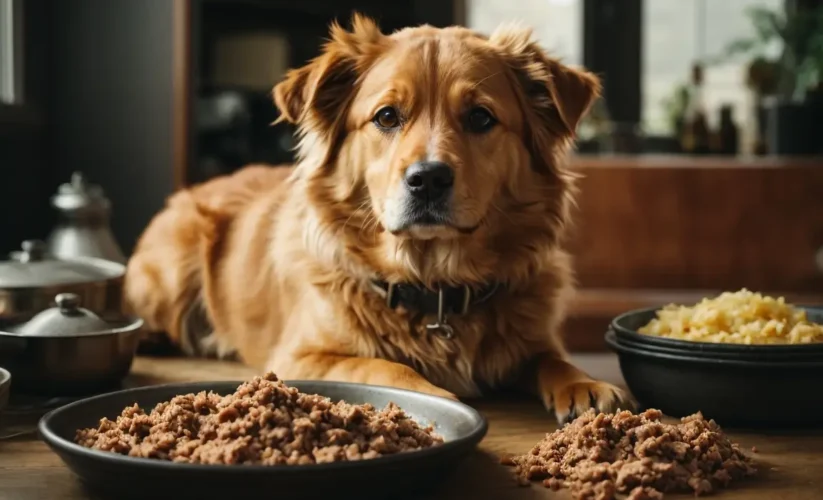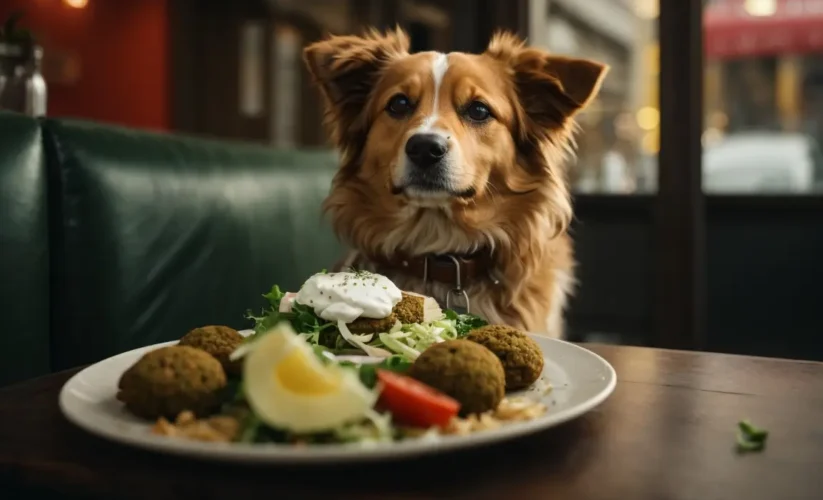Can dogs eat ground turkey?

Hello, fellow dog lovers! Today, we’re tackling a question that’s often on the minds of many pet owners: Can dogs eat ground turkey? As a dedicated dog blogger and proud owner of a furry friend, I’ve encountered numerous queries about the suitability of various human foods for dogs. Ground turkey, a staple in many households, is no exception. This versatile and lean meat is a popular choice in our diets, but when it comes to our canine companions, the decision to include it in their meals warrants a deeper exploration.
Understanding what we feed our dogs is crucial for their health and well-being. The dietary needs of dogs are significantly different from ours, and what may be healthy for humans can sometimes be harmful to dogs. In this comprehensive post, we will delve into the nutritional value of ground turkey for dogs, examining its benefits and potential risks. We’ll also discuss the proper ways to prepare it and how it compares to other turkey meats.
This exploration isn’t just about saying ‘yes’ or ‘no’ to ground turkey. It’s about understanding how this food fits into the broader context of a balanced canine diet. We’ll consider various factors, including protein content, fat levels, and potential allergens, to provide a well-rounded view. Whether you’re curious about incorporating ground turkey into your dog’s diet or seeking alternatives, this post aims to offer valuable insights.
So, if you’re preparing a special meal for your pup or just curious about expanding their dietary options, keep reading. We’re about to embark on a detailed journey into the world of dogs and ground turkey, ensuring you’re well-informed to make the best choices for your furry friend’s health.
Is Ground Turkey Good for Dogs?
Ground turkey is increasingly becoming a popular choice in human diets, known for its lean quality and versatility. But how does this translate to our canine companions? The short answer is that ground turkey can be a beneficial component of a dog’s diet, but with certain caveats.
Firstly, turkey is an excellent source of protein, which is an essential component of a dog’s diet. Proteins are the building blocks of body tissues and are crucial for growth, maintenance, and repair. Unlike fats and carbohydrates, the body doesn’t store protein, so it needs a regular supply. Ground turkey is rich in high-quality protein, providing the necessary amino acids that dogs need for muscle development and energy.
Moreover, ground turkey is low in fat compared to other meats like beef or pork. This makes it an ideal choice for maintaining a healthy weight in dogs. Obesity is a significant concern in pets and can lead to serious health issues like diabetes, joint problems, and heart disease. Incorporating lean meats like ground turkey can help in managing a dog’s weight effectively.
Another advantage of ground turkey is its nutrient profile. It contains essential vitamins and minerals such as B vitamins, selenium, and zinc. These nutrients play vital roles in various bodily functions, including supporting the immune system, aiding in wound healing, and maintaining a healthy skin and coat.
However, the way ground turkey is prepared for dogs is crucial. Seasonings, garlic, onions, and excessive salt, which are often used in human cuisine, are harmful to dogs. When preparing ground turkey for your pet, it should be cooked plain and thoroughly to avoid any potential health risks, including bacterial infections like salmonella.
Despite these benefits, it’s important to note that ground turkey should not be the sole component of your dog’s diet. Dogs require a balanced diet with a proper mix of proteins, carbohydrates, fats, and essential vitamins and minerals. Ground turkey can be a part of this balanced diet, but it should be combined with other nutritional food sources to ensure your dog’s dietary needs are fully met.
Is Ground Turkey Bad for Dogs?
While ground turkey can offer nutritional benefits to dogs, there are circumstances where it might not be the best choice for those asking ‘can dogs eat ground turkey’. Understanding these potential drawbacks is essential for making informed decisions about your dog’s diet.
One of the primary concerns with ground turkey, and poultry in general, is the risk of food allergies. Some dogs might have or develop an allergy to turkey, which can manifest as skin irritations, gastrointestinal upset, or ear infections. It’s important to introduce new foods like ground turkey gradually and monitor your dog for any signs of allergic reactions.

Another consideration is the quality and preparation of the ground turkey. Low-quality ground turkey may contain preservatives, additives, or fillers that are not suitable for dogs. These can cause digestive issues or other health problems. Always opt for high-quality, lean ground turkey and avoid any added seasonings or spices. Remember, what’s tasty for humans can be harmful to dogs.
Additionally, while ground turkey is a lean meat, it does contain fat. Dogs with a history of pancreatitis, digestive issues, or specific dietary needs may need to avoid even moderate fat content. High-fat diets can exacerbate these conditions, leading to health complications. In such cases, consulting with a veterinarian is crucial before introducing ground turkey into their diet.
The method of cooking is also a key factor. Ground turkey must be thoroughly cooked to ensure it’s safe for consumption. Raw or undercooked turkey can harbor harmful bacteria like salmonella, which can cause serious health issues in both dogs and humans. Always ensure the ground turkey is fully cooked before serving it to your dog.
Ground turkey can be a beneficial part of a dog’s diet, it’s not suitable for all dogs. Factors like allergies, the quality of the meat, its fat content, and proper cooking methods must be considered. Always prioritize your dog’s specific health needs and dietary restrictions, and consult with a veterinarian when in doubt.
Are Other Turkey Meats Safe for Dogs?
When considering ‘can dogs eat ground turkey’ as a dietary option for dogs, it’s not just ground turkey that comes into focus. Other forms of turkey meat, like turkey breast or cooked turkey slices, can also be incorporated into a dog’s diet. However, as with ground turkey, there are specific considerations to keep in mind.
Turkey breast, known for its lean quality, can be a great source of protein for dogs. It’s typically lower in fat compared to darker cuts of turkey and is devoid of harmful seasonings if prepared correctly. As with ground turkey, ensure that the turkey breast is cooked plainly without spices or additives that can be harmful to dogs.
On the other hand, certain parts of the turkey should be avoided. Turkey skin, while appetizing to humans, is high in fat and can cause digestive issues in dogs, potentially leading to pancreatitis. Additionally, turkey bones are a strict no-go. Cooked turkey bones can splinter and pose a choking hazard or cause internal injuries. It’s important to always remove bones from any meat you’re serving to your dog.
While turkey meat can be a healthy addition to a dog’s diet, balance is key. A dog’s diet should not consist solely of turkey or any single type of meat. A balanced diet that includes a variety of protein sources, along with appropriate portions of carbohydrates, fats, and essential nutrients, is vital for maintaining a dog’s overall health.
In summary, other forms of turkey meat can be safe for dogs, provided they are prepared properly and served in moderation. Always prioritize lean cuts, cook them plainly, and avoid bones and high-fat portions like the skin. Remember, the goal is to contribute to a balanced and nutritious diet for your dog.
Final Thoughts
In wrapping up our exploration into whether dogs can eat ground turkey and other turkey meats, it’s clear that these can be healthy and nutritious options for our canine friends, but with important caveats.
Ground turkey, when served plain and cooked, offers a lean source of protein and essential nutrients. However, individual considerations such as allergies, the quality of the meat, and your dog’s overall health and dietary needs play a crucial role in determining whether it’s suitable for your pet. The same principles apply to other turkey meats, emphasizing the need for lean cuts, proper cooking, and avoidance of harmful parts like bones and skin.
The overarching message here is that a balanced diet is essential for your dog’s health. Whether you choose to include ground turkey or other turkey meats, they should be part of a varied and nutritionally complete diet. Regular consultations with your veterinarian are invaluable in ensuring that your dog’s dietary needs are being met, especially if they have specific health concerns or dietary restrictions.
As dog owners, our ultimate goal is to provide our pets with a diet that supports their well-being, contributes to their longevity, and keeps them happy and healthy. Ground turkey and other turkey meats can be a part of this equation, but they are just one piece of the larger dietary puzzle.
Remember, every dog is unique, and what works for one may not work for another. Always approach your dog’s diet with care, knowledge, and love, ensuring that every meal contributes positively to their health and happiness.










